Scientists are planning to feed bugs such as mealworms and house crickets to children aged five to 11 years old from four Wales-based primary schools.
A Mail Online report said they are planning to serve up bolognese as well, made from plant and insect protein, and potentially urge them and their parents "to move away from meat."
The project, led by Cardiff University and the University of the West of England or UWE Bristol academics, will evolve as well, examining the primary school children to determine their attitudes towards environmental issues and how they translate into views on the food they're eating.
From this, they wish to identify the best way to dedicate the younger generation, as well as their families, in terms of nutritional and environmental benefits of edible insects and, in turn, lessen the consumption of meat worldwide.

Health Benefits of Edible Insects
A study published in Critical Reviews in the Food Science and Nutrition journal specified that edible insects might have superior health benefits because of their high levels of vitamin B12, zinc, iron, essential amino acids, fiber, antioxidants, and omega-3, and omega-6 fatty acids.
Essentially, the addition of edible insects like crickets to the human diet could offer numerous environmental and nutritional benefits, which include an overall reduction in greenhouse gas emissions, improved prevention and management of chronic diseases such as diabetes, cardiovascular disease, cancer, decreased agricultural use of land and water, and improved immune function.
Crickets, grasshoppers, silkworms, locusts and mealworms will be on the menu for primary school kids to make UK greener https://t.co/B924GZXjTw
— GB News (@GBNEWS) May 30, 2022
Ultimately, insects have the potential to be used as meat alternatives or dietary supplements, leading to human health and environmental benefits.
Meat-Free Diet
A report from Finder UK said that more than seven million adults in the United Kingdom are following a meat-free diet, and 8.8 million more are intending to switch to vegetarian or vegan diets this year.
Meat-free diets are most predominant in the 18 to 23 demographic, although studies on younger children are limited.
Although yet to be famous in the UK, consuming insects as food is practiced by two billion people worldwide, specifically in Asia, Africa, and Latin America.
Notably, edible insects are increasingly sold throughout the EU and the Food Standards Agency is presently evaluating house crickets for human consumption, with mealworms possible to be submitted soon.
Insects as a 'Novel Food'
The EU introduced food regulations classifying insects as a "novel food" two years ago, meaning they had to undergo new safety checks before being approved by the Food and Drug Administration.
This was not changed when the UK left the EU, although the FSA is expected to authorize edible insects to be traded in supermarkets and retailers temporarily in June, with full approval expected in 2023.
A study has suggested that if insects are farmed commercially, emissions and water use are lower for each square foot than land use required for livestock.
Meanwhile, in 2010 research, scientists from the University of Wageningen in the Netherlands discovered that a pound of mealworm protein had a greenhouse gas footprint, one percent as large as one pound of beef.
Risk of Meat-Heavy Diet
Meat-heavy diets risk not just human health but the planet, too, as livestock farming on a massive scale destroys habitats and produces greenhouse gases.
Furthermore, animal agriculture contributes to global warming due to the methane, nitrous oxide, and livestock's carbon emissions and supply chains.
Experts at Greenpeace have said Britons should eat 71 percent less meat and dairy by 2030 to prevent "climate breakdown."
Related information about edible insects is shown on TheEdibleInsect's YouTube video below:
RELATED ARTICLE : Meatless Eating by 2035? Company CEO Claims No One Will Eat Products from Slaughtered Animals in Less Than 15 Years
Check out more news and information on Diet in Science Times.











